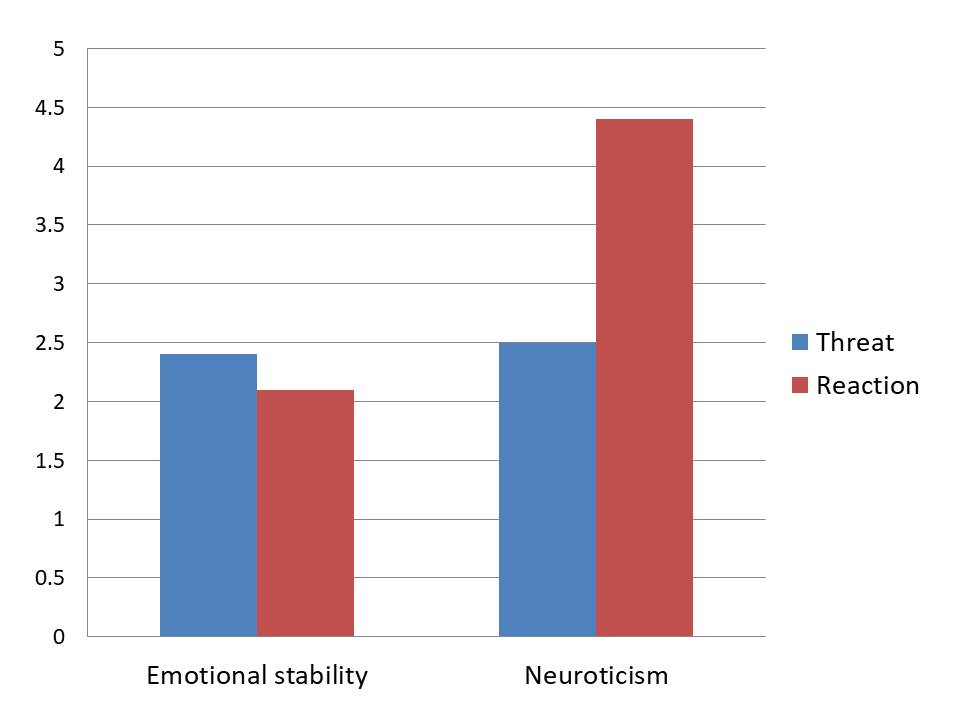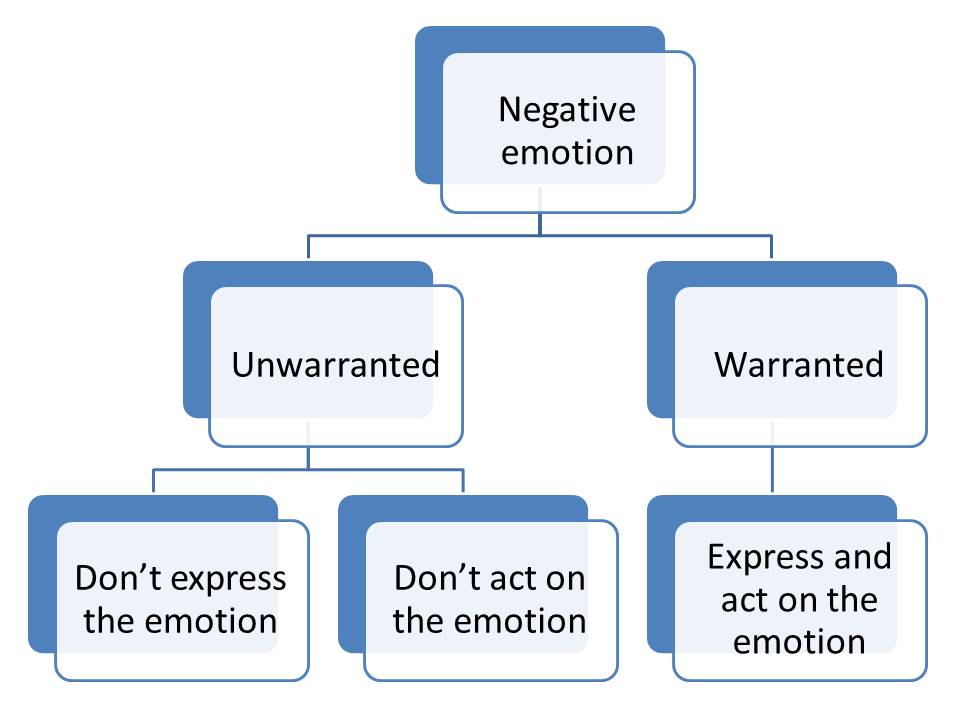Neuroticism is a personality trait in the Big 5 or OCEAN model of personality. It lies on one end of a spectrum, the opposite end of which is Emotional Stability. Thus, those scoring high on Neuroticism tend to be emotionally unstable.
Neurotics experience negative thoughts and emotions frequently and intensely. They have a lower threshold of experiencing worry, anxiety, and depression. Neurotics overthink and over-analyze everything to the point of causing distress. They’re irritable and chronic negative thinkers.
Seeing the negative side of things isn’t necessarily bad as it helps to be better prepared. The main issue with neurotics is that their negative emotional reactions are often disproportionate to the threats they’re experiencing.
In other words, they’re prone to perceiving neutral events negatively and their reactions to minor, everyday inconveniences are overblown.
To give an example, they’ll get overly upset if they spill a drink on their clothes. While an emotionally stable person understands these accidents happen, a neurotic will make a big deal out of it.
If an emotionally stable person is criticized, they might think it had little to do with them and more with the commenter. In contrast, a neurotic person may get upset over the comment and ruminate over it endlessly.

Neurotics have a heightened sensitivity to potential threats. They have an overactive stress response. It’s difficult to pinpoint the exact cause of neuroticism. Researchers believe that both biological and environmental factors are at play.1
Benefits of reducing neuroticism
Since neuroticism likely has a genetic and biological component, it isn’t something one can overcome completely. While one can’t stop being neurotic, one can at least restrain their neuroticism.
Neuroticism takes a huge mental toll on the individual. It makes a person prone to experiencing unnecessary stress and other mental health problems.
A neurotic’s social life is also negatively affected. Since they overreact to minor inconveniences, others feel like they have to be on their toes all the time. This reduces comfort, and the lack of comfort is detrimental to a relationship.
People want to be with people who’re chill, and neurotics are anything but chill. They spread their negativity and negative emotions to others. People have enough negativity of their own to deal with than to carry the burdens of other negative thinkers.

How to be less neurotic
Following are the strategies and tactics that can greatly help reduce neuroticism:
- Learn to hide negative emotions
- Develop self-awareness and emotional intelligence
- Think about the consequences
- Overcome cognitive distortions
- Use healthy coping strategies
- Learn perspective-taking
1. Learn to hide negative emotions
The major problem with neuroticism is emotional reactivity. If you’re neurotic, you need to work on reducing your emotional reactivity. Emotional reactivity simply means displaying emotional reactions.
Internally, you can feel however you want to feel. You don’t have much control over that. You only need to work on reducing your emotional displays. Others can’t know about your emotional state unless you show it in your facial expressions, words, and body language.
When I talk about hiding your emotions, I don’t mean suppressing them. Hiding emotions is not the same as bottling them up. You’re not denying how you feel. You acknowledge how you feel internally– even analyze it- but choose to not let it show.
I know there’s a lot of talk these days about being vulnerable and showing your emotional side. The reality is: If you do that you’ll come across as weak and lacking self-control.
People instinctively know that controlling emotions requires considerable mental strength. So if you’re an emotional mess, you’ll be perceived as mentally weak- like it or not- even by people who applaud you for being so vulnerable.
I suggest you reserve your vulnerability for those closest to you.
When you’ve practiced hiding your emotions for long, you get good at handling emotionally difficult situations. Others see you as a calm and mature person. The key is to keep practicing. Traits are developed with practice.2
Eventually, you might even reduce your neuroticism because you not getting emotional presents disconfirming evidence to the mind. The mind likes to see consistency in how you feel and behave. When you cut the behavior part, the mind’s like:
“Okay, no negative emotions were displayed. Maybe these emotions I’m sending are unwarranted.”

2. Develop self-awareness and emotional intelligence
You can curb your neurotic tendencies if you’re highly self-aware and emotionally intelligent. Self-awareness and emotional intelligence help you look at your emotional state objectively. You try to understand why you’re feeling the way you’re feeling.
When you attain objectivity in an emotional situation, you’ll already have reduced your neuroticism by half. It automatically makes you emotionally unreactive. You can use these instances to better understand yourself and what triggers you.
Becoming more self-aware and emotionally intelligent will also help you ascertain whether your emotional reaction is warranted.
3. Think about the consequences
Many times, going on a neurotic rant can have negative consequences for us. When we’re under the grip of an emotion, it’s hard to foresee the consequences of our neurotic outbreak.
Arguments and fights often start with a neurotic outbreak. You behave neurotically; they respond to your neuroticism with their neuroticism, and the whole thing blows up.
4. Overcome cognitive distortions
Neurotic behavior often results from a faulty perception of reality. We humans have a negativity bias. We pay more attention to the negative stuff so we can be better prepared and ensure our survival.
This bias leads to overreaction i.e. seeing negativity where there is none and reacting to it.
While emotionally stable people can see through these distortions, neurotics have a hard time doing so.
One such cognitive distortion is overgeneralization. A neurotic will fail in a test and think they’re a failure. Anything bad happens to them and they’re quick to attribute it to their lack of competence.
Another such distortion is catastrophizing i.e. perceiving a situation as worse than it really is. For example, after getting rejected at a job interview a neurotic person may be like:
“I’m never going to get a job.”
This cognitive distortion can be countered by asking questions like:
“Really? You only got rejected once. How can you be so sure? There are people who got rejected much more than you and still landed a job.”
5. Use healthy coping strategies
When people are under the grip of negative emotions, they get desperate to feel good again. They chase instant pleasure and fall into the trap of addictions.
There are better ways to cope with negative emotions.
You could write down how you feel, listen to music, watch a movie, take a walk, talk to a friend, exercise, etc. All these activities will reduce the intensity of negative emotions and give you time to analyze them more rationally.
While it’s a much-debated topic, the dichotomy between emotionality and rationality is real. You can’t be both emotional and rational at the same time. It’s like a switch exists in your mind that can only let you be in emotional or rational mode.
Reacting too emotionally too soon is rarely a good idea. Let the emotions subside. Let the fog clear, the dust settle. Then you can see more clearly and respond appropriately.
6. Learn perspective-taking
Many social problems occur because people fail to see things from others’ perspective. The default tendency is to only care about your own perspective. So, one has to continually work on putting one in others’ shoes.
Neurotics are hyper-focused on the negatives in the world, in themselves, and in other people. They’re waiting to get offended. They see confrontations where there are none.
Learning to see things from others’ perspectives helps you better understand their motives. It helps you resist jumping to the conclusion that people are out to get you.
References
- Barlow, D. H., Ellard, K. K., Sauer-Zavala, S., Bullis, J. R., & Carl, J. R. (2014). The origins of neuroticism. Perspectives on Psychological Science, 9(5), 481-496.
- Hudson, N. W., Briley, D. A., Chopik, W. J., & Derringer, J. (2019). You have to follow through: Attaining behavioral change goals predicts volitional personality change. Journal of Personality and Social Psychology, 117(4), 839.

